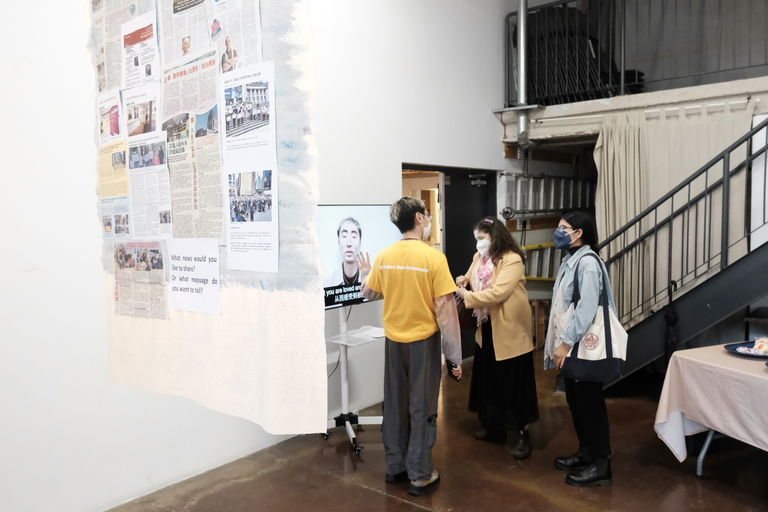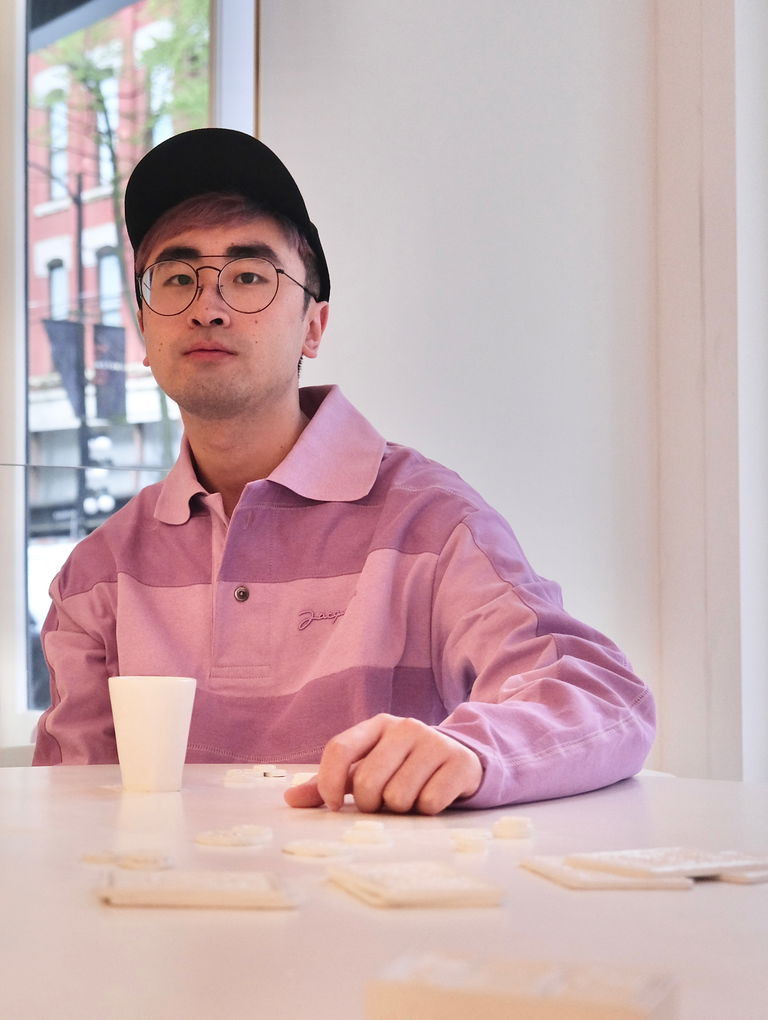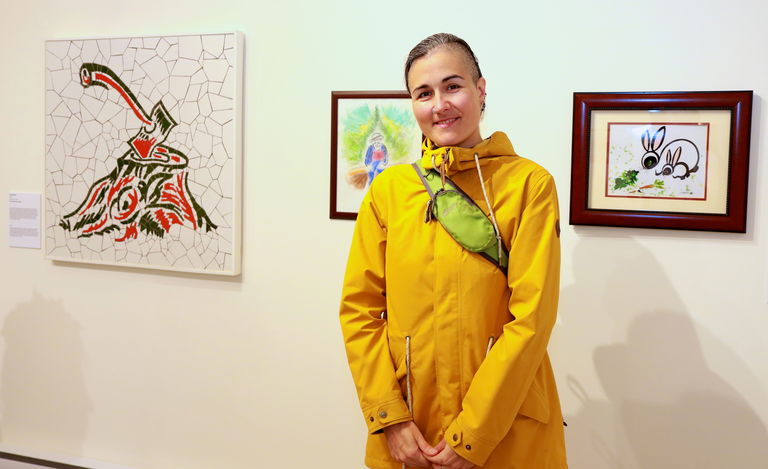Peisen Ding and Kay Slater

Peisen Ding and his mentor Kay Slater have worked together in professional settings before this mentorship experience. The two will continue to collaborate and connect in the future. For Kay, and Peisen too, the mentorship has been meaningful as an opportunity to share culture and lived experience as they prioritized community and access through their collective work.
Peisen Ding: Kay is greatly helpful and supportive! My biggest accomplishments working with them include learning more about accessibility technologies and installation processes for exhibitions, learning time management as a professional artist, and making connections with local galleries and communities.
BC Culture Days: Kay, from your perspective, what was the main focus of this mentorship? Why is mentorship in the arts important?
Kay Slater: I was primarily focused on creative access and accessibility throughout. Peisen was the artist, and it was not my place to curate or poke at his artistic practice but to bring accessibility into each part of the planning, creation, production, and execution of the work. My mentorship style tends to be conducted through many questions rather than assuming that others on my team don’t know or won’t bring a unique perspective to problem-solving.
Mentorship is essential to the arts. Without community and conversation, we’re making in a vacuum. To assume that career experience is synonymous with good, right or better is to ignore inequality in systems that benefit privilege and whiteness. Mentorship is essential for all parties because it gives those with relevant experience a chance to reflect and grow as they experience a new perspective within shared areas of their practices and the chance to reflect on a time when they didn’t have the privilege of experience/age while giving those with less experience a chance to test and validate their practice in more safe and intimate ways before taking the next public leap.
BC Culture Days: Were there any moments that stood out to you both during this mentorship?
Peisen Ding: I remember the day we installed my work at grunt Gallery. I was asking Kay, “Do you think it’s a little bit rushed? In terms of my artwork.” I felt a little bit insecure about the exhibition. First of all, it was my first solo exhibition in Vancouver, so I felt nervous. Second of all, I was trying to promote that art is fun and approachable and it doesn’t need to be like ‘Eurocentric high art.’ I was trying to create a comfortable space for everyone. A lot of my work is not in a “complete status.” So, I was asking Kay, “Do you think the work is rushed?” Then Kay started asking me, “Well, how do you feel?” The questions they asked me were very encouraging and conveyed in a way that firmed my confidence. The questions were very helpful to make me feel, “Oh, actually, I’m doing good. So, don’t worry.” I feel Kay is super generous and supportive because there is continuous support from them.
Kay Slater: There was a moment when we were working together on the voice-over for the exhibition didactics that stuck in my mind. Peisen and I committed to having audible didactics available for non-visual participation and those better served with audio versions of the information. We produced them in English and Mandarin. We both wrote the text and produced the audio using Speechify through AI-generated voice. I copied and pasted everything into the program and set it up, but I needed Peisen to listen to the Mandarin and ensure the pronunciation was correct.
One of his friends had popped by while we were working, and I sat back while the two of them chatted and laughed as they cycled through the different voice profiles within the program. They chatted away, and I reflected that this was also essential within mentorship projects. It’s not just about those working and producing but about connecting, trying, and laughing together. I am sure their friend didn’t walk away thinking they had done anything important - but it was important to me. I couldn’t provide feedback for audio, and I especially couldn’t do it for another language that I didn’t know. I suppose I could have given a bunch of English/Western/Eurocentric suggestions here (asserting my dominance as a mentor) but who would that even have been for? What would that have served? Peisen and his friend picked the voice that worked for them, and I trusted them. They knew best! And they had fun while they were doing it.
While that might not have been my active thinking at the moment, in reflecting, I know that it was my experience and recommendation that we commit to non-visual participation that led to this moment, but by stepping back, I got to observe this lovely moment of joy and sharing and creation. This is what I want from mentorship.
To return to the blog post click here.
Learn more about the events that Peisen hosted for Culture Days.
Read all of the 2023 mentor bios.

Peisen Ding is a visual artist and an art educator living on the unceded traditional territories of the xʷməθkʷəy̓əm (Musqueam), Sḵwx̱wú7mesh (Squamish), and səlilwətaɬ (Tsleil-Waututh) Nations. Peisen’s art practice often involves the exploration of urban relationships, such as relations with other individuals and built environments, through photography, painting, pottery, installation and/or whatever medium and form arise organically in the process. As a queer Chinese immigrant, it is also important for Peisen to discover what life brings when living with different identities and cultures, and how art can show care, love, and courage to others who have similar backgrounds. Peisen believes that art can not only help us see and empower ourselves but also has the responsibility to unfold what is happening and changing in society. This view has led Peisen to research education, diving deeper into what art can bring to the learning of ourselves and the world around us.

Kay Slater is a multidisciplinary artist, accessibility consultant and arts worker. Their artistic practice explores value as it relates to process and expectations. Kay’s work is rooted in anti-oppression practices, and they employ open source and community-engaged approaches to support ongoing knowledge transfer with makers and creators at all stages of their careers. Kay is dedicated to expanding art making opportunities where verbal and non-verbal communication is used and where no one is ever turned away for lack of skill or understanding. They subscribe to the philosophy of the New Sincerity, a trend that tries to expand upon and break away from concepts of postmodernist irony. Kay is queer and hard of hearing. As a guest on the unceded, ancestral territories of the Coast Salish people, specifically the xʷməθkʷəy̓əm (Musqueam), Sḵwx̱wú7mesh (Squamish), and sə̓lílwətaʔɬ (Tsleil-Waututh) Nations, Kay is learning, searching for joy, participating in, standing with, and witnessing landback initiatives for Indigenous Sovereignty.